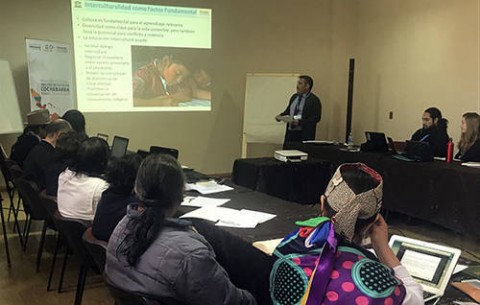
GCED Basic Search Form
Quick Search
현재 위치
뉴스

-
The proposals on education, which were the result of discussions held at the II International Workshop on Indigenous Knowledge in Latin America, are part of UNESCO's work on intercultural issues. The points raised adopt a comprehensive and human rights approach and are linked to the global aims of the 2030 Agenda. These recommendations are intended to guide actions in education and intercultural issues through to 2030.
A proposal prepared by experts in indigenous themes in education, with contributions from leaders and ministerial representatives from Mexico, Guatemala, Ecuador, Peru, Bolivia, Chile, Paraguay, Panama and Argentina, was presented to the Education Ministers of Latin America and the Caribbean on July 26 during the II Regional Ministerial Meeting in Cochabamba, Bolivia.
The recommendations focus on respect for and appreciation of indigenous knowledge in education; the incorporation of indigenous knowledge as a prerequisite of interculturality in state policies at all levels of education; the progress made in terms of gender equity and inclusion of indigenous knowledge; and strengthening the commitment of states to foster policies that revitalize and promote indigenous languages.
Points of the proposals
The recommendations are the result of discussions held at the II International Workshop on Indigenous Knowledge in Latin America, held on July 24, 2018 in Cochabamba. In his inauguration speech, Roberto Aguilar, Minister of Education of the Plurinational State of Bolivia and host of the meeting, stressed the importance of these issues in the region: "As countries of Latin America and the Caribbean, one of our fundamental objectives is to bring renewed value to, recover, strengthen and project in time all that is represented by native peoples within the framework of our existence as peoples and states, and which are projected as part of the rights of indigenous peoples and nations."
The presentation of the workshop’s conclusions to the ministers detailed the following points:
Respecting and recognizing the value of indigenous knowledge in education: Recover and recognize the value of indigenous knowledge from a complementary perspective in terms of multicultural and intercultural societies; incorporate and expand indigenous knowledge in various areas; promote research policies, documentation and the deepening of indigenous knowledge through community methodologies and practices specific to peoples and on the basis of their languages.
Incorporating indigenous knowledge as a prerequisite of intercultural issues and state policy at all levels of education: Ensure the binding and protagonistic participation of indigenous peoples in the definition of policies and implementation of inter-, intra- and multilingual education; make progress in the area of teacher training, recognizing teachers as central subjects, and with the participation of parents in intercultural, bilingual, intracultural and multilingual education, ensure pertinent and relevant training processes, certifying their work and paying decent wages; and promote the development of autonomous regional curricula in accordance with the socio-cultural characteristics of the indigenous peoples.
Making progress in gender equity and the inclusion of indigenous knowledge: Promote debate and research, from the worldview of indigenous peoples and women, the issues of gender inequality, sexuality and sexual diversity; guarantee institutional mechanisms for recognizing and certifying authorship and intellectual property rights with respect to the wisdom and knowledge acquired and researched by indigenous women; ensure access to quality education at all levels and promote the participation of indigenous women in positions of leadership and political decision making; and promote procedures for presentations against any type of discrimination and violence against indigenous girls and women.
Strengthening the commitment of states with respect to the promotion of policies for the revitalization and promotion of indigenous languages: Create and strengthen institutions dedicated to the research and promotion of indigenous languages; implement linguistic policies from within the communities that allow progress to be monitored in the teaching and training processes of teachers of indigenous languages; promote the use of indigenous languages as a right in all public and private institutions and services; make legal progress with policies for the dissemination and assessment of indigenous languages and multilingualism in the media and social networks (ICTs); promote the generation and financing of materials and books in indigenous languages; develop, together with indigenous organizations in Latin America, a common reference framework for teaching indigenous languages, taking into account local realities; and promote a regional indigenous knowledge network that will be at the forefront of actions carried out within the framework of the International Year of Indigenous Languages in 2019.
The document emphasizes that the Education 2030 Agenda is also a call to value the diversity and multilingualism that characterizes the peoples and territories of the region. Its implementation requires a special political will on the part of states to ensure the full development of indigenous knowledge and languages in educational processes, thus ensuring quality lifelong education for all. In this regard, Atilio Pizarro, Chief of the Planning, Management, Monitoring and Evaluation Section of the Regional Bureau for Education in Latin America and the Caribbean (OREALC/UNESCO Santiago) indicated that these recommendations will imply "the coordination of actions that are already being developed. What UNESCO offers is to help coordinate these proposals, contribute towards efforts and resources, and provide assistance so that this issue is recognized and incorporated into the educational policies of the region, in accordance with the challenges presented by the E2030 Agenda."
Más información:
- Download the recommendations presented to the ministers (pdf)
-
II International Workshop on Indigenous Knowledge in Latin America
-
II Regional Meeting of Ministers of Education of Latin America and the Caribbean
*****
In its 2018-2019 Action Plan, the Indigenous Knowledge Network, coordinated by the Regional Bureau for Education in Latin America and the Caribbean (OREALC/UNESCO Santiago), will continue to coordinate meetings on intercultural issues, as well as to provide advice on the development of national and subregional reports, among other interventions.
Similarly, it was announced in Cochabamba that the III International Workshop on Indigenous Knowledge in Latin America will be held in Santiago, Chile in January 2019.
URL:
